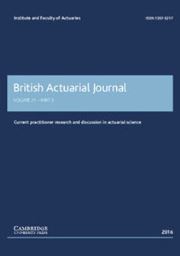No CrossRef data available.
Article contents
Notes for a Discussion on the European Single Currency
Published online by Cambridge University Press: 10 June 2011
Abstract
This paper forms notes for discussions about the European single currency at the Institute of Actuaries and the Faculty of Actuaries. The author assumes (and hopes) that the single currency will start on time in 1999, with most of the Member States of the European Union included. The key dates are 1 January 1999, when the exchange rates between currencies will become irrevocably locked and become conversion rates, and 2002, when euro notes and coins will be introduced, and the retail banking sector will convert to euros. The advantages of a single currency are potentially very great; the costs are also considerable. Governments of Member States will no longer be able to get a competitive advantage by devaluing their currency, or be able to choose an inflation rate that is different from that of the E.U. as a whole. The key document is the Maastricht Treaty, and the conversion criteria included therein are discussed. The author concludes that, if governments choose to interpret the criteria leniently, all countries, except possibly Greece, will be included in 1999, with Greece joining a year or two later. Some of the practical considerations for actuaries, including life insurance, general insurance, pensions, banking and investment are mentioned. The paper is not comprehensive, and is a personal contribution to stimulate discussion.
Keywords
Information
- Type
- Sessional meetings: papers and abstracts of discussions
- Information
- Copyright
- Copyright © Institute and Faculty of Actuaries 1997

